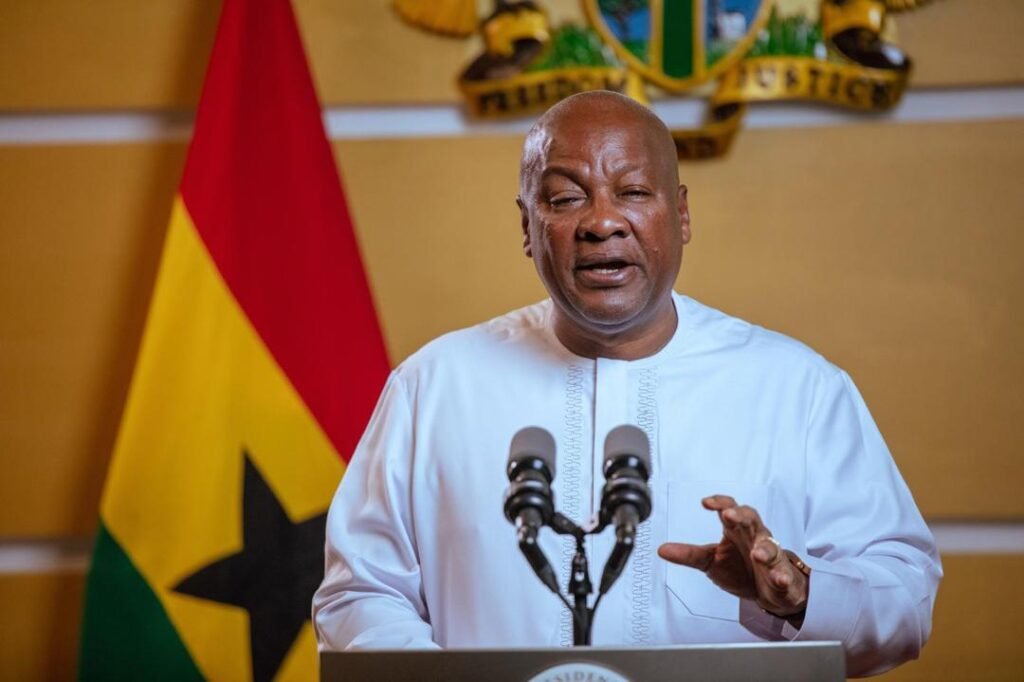A Market Researcher and volunteer associate with the IMANI Centre for Policy and Education, Kay Cudjoe, has delivered a stinging critique of the state of Ghana’s anti-galamsey campaign and urged President John Dramani Mahama to move from words to forceful action.
In a hard-hitting commentary, Kay Cudjoe framed galamsey not simply as an environmental problem but as “economic sabotage and environmental terrorism,” arguing that piecemeal responses will not stop the destruction of rivers, farms, and communities.
“Every Ghanaian carries the wound of galamsey. Our rivers, once clear enough to drink by hand, now run like mud. Our farms lie in scars, our cocoa trees wither in poisoned soil, and our children inherit water that cannot quench thirst. This is what galamsey has done to us”.
Kay Cudjoe
Kay Cudjoe’s intervention comes amid conflicting public perceptions of the government’s response. He cited a Global Info Analytics tracking poll from April 2025 showing that 38 percent of Ghanaians believed the fight against galamsey had improved under President Mahama, while 44 percent felt nothing had changed, and 10 percent said the situation had worsened.
Striking Paradox
A later July 2025 survey, however, told a different story — 65 percent approved of how the President was handling the crisis, with 24 percent disapproving. “The paradox is striking: people say they trust his intent, but they still struggle to see enough change on the ground,” Kay Cudjoe observed.

That gap between intent and visible results is central to his critique. “So when John Dramani Mahama returned to power in January 2025, many hearts lifted. Maybe this time, the man would fight not with speeches but with action. And yet here we are, listening, waiting, judging,” he wrote.
Kay Cudjoe noted that the President is understood to grasp the challenge: the networks orchestrating illegal mining are not merely ill-equipped youth but powerful, well-funded cartels that can exact a political and personal cost on any leader who confronts them.
Kay Cudjoe also pointed to how public reaction has evolved: early skepticism hardened into stronger support for decisive action. Social media, he wrote, turned the President’s media encounter “into punchlines,” while civil society groups labeled official responses “uninspiring.”
“The opposition pounced, gleeful at every stumble,” he added, arguing that political fallout should not deter firm measures. On tactics, Kay Cudjoe considered the controversial option of declaring a state of emergency.
“Some say the solution is to declare a state of emergency. It would be bold. It would give the military power to clear sites, protect rivers, and show that the government means business.
“But it could also hurt the very communities we want to save: farmers, small-scale miners, and traders who depend on that fragile economy. A state of emergency could silence rights, deepen poverty, and if it fails to change the picture, it would leave Mahama weaker than before.”
Kay Cudjoe

Yet he also warned that delayed or half-hearted use of extraordinary powers could leave the President weakened if the intervention failed to deliver results. Kay Cudjoe’s prescription is uncompromising.
Bold Measures
He called for visible, enforceable measures ordinary Ghanaians will immediately recognize: “Arrest and prosecute the untouchables. Deploy armed security to lock down the pits, not as peacekeepers but as defenders of the nation. Make it clear that those who persist are enemies of the state, not wayward citizens.”
He urged the administration to “prepare the country for a State of Emergency that is total in reach, swift in punishment, and ruthless in execution” — words that make clear his belief that half-measures have failed.
The column did not shy away from the political realities. He noted that citizens give leaders “second chances,” that patience is finite, and that President Mahama’s political capital depends on delivering tangible outcomes.
“Ghanaians have given Mahama a second chance, and they still give him their patience. But patience is thin. It will not survive more hesitation. It will only survive results.”
Kay Cudjoe
Kay Cudjoe’s argument resonates with communities that have seen livelihoods and ecosystems devastated. He insisted that the measure of success is not press conferences or showy swoops, but clean water, restored farms, and secure homes.

“A clean river convinces more than a hundred press conferences,” he wrote, and that line encapsulates his central thesis: effective governance is measured in restored life, not public relations.
Kay Cudjoe’s message to the President is unambiguous: “Mr. President, the nation is watching. The people are thirsty for hope. And the rivers are begging for life.” Whether the government embraces the urgency and the specific, tough remedies he prescribed remains the central question for Ghana’s environmental and political future.
READ ALSO: Mining Consultant Demands Parliament Oversight on GoldBod’s $1B Dubai Deal



















